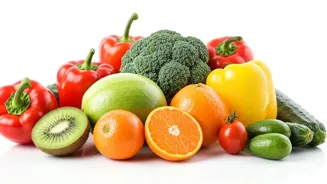Myth 1: All Carbs Are Bad
The notion that all carbohydrates are detrimental to health is a common misconception. Many people wrongly believe that they should eliminate carbs entirely
from their diet to lose weight or improve health. However, carbohydrates are a vital macronutrient that provides the body with energy, especially in the form of glucose. Complex carbohydrates, like those found in whole grains, fruits, and vegetables, are particularly important. These foods also offer essential fiber, vitamins, and minerals. Restricting carbs excessively can lead to nutrient deficiencies and a feeling of fatigue. Instead of avoiding carbs altogether, the key is to choose complex, nutrient-dense sources over processed and refined options.
Myth 2: Diet Soda Is Healthy
The idea that diet sodas are a harmless alternative to regular sugary drinks is another prevalent myth. While diet sodas are calorie-free, they contain artificial sweeteners, which some studies suggest can have adverse effects. These sweeteners might disrupt the gut microbiome, which can influence metabolism and appetite regulation. The body also may not recognize the difference between artificial and natural sweeteners and can still trigger an insulin response. Moreover, the consumption of diet soda has been linked to increased cravings for sweet foods and a higher risk of certain health problems, such as metabolic syndrome. Water and other unsweetened beverages are always a better and healthier choice.
Myth 3: Gluten-Free Is Always Better
The popularity of gluten-free diets has led to a misconception that gluten-free products are automatically healthier. While individuals with celiac disease or gluten sensitivity must avoid gluten, for others, eliminating it isn't necessary for better health. Many gluten-free products are highly processed and may contain fewer nutrients than their gluten-containing counterparts. If someone doesn't have a diagnosed gluten intolerance, there’s no scientific backing that cutting gluten will result in health improvements. It’s more critical to concentrate on a balanced diet with whole, unprocessed foods. Focusing on variety and adequate nutrient intake is the most important part of a healthy diet.
Myth 4: Detox Cleanses Are Necessary
Detox cleanses are often promoted as a way to eliminate toxins and improve health, but the human body has its own efficient detoxification systems. The liver and kidneys are primarily responsible for removing waste and toxins. There is no scientific evidence to support the idea that these cleanses are necessary or effective. In fact, some cleanses may be restrictive and lead to nutrient deficiencies or even other health problems. A healthy diet rich in fruits, vegetables, and whole foods already supports the body's natural detoxification processes. The best approach is to maintain a healthy lifestyle overall, focusing on nutritious food, regular exercise, and adequate hydration.
Myth 5: All Fats Are Unhealthy
For many years, fat was vilified as the enemy of weight loss and good health. However, this is a significant oversimplification. Healthy fats are essential for overall well-being, supporting hormone production, nutrient absorption, and brain function. Monounsaturated and polyunsaturated fats, found in foods like avocados, nuts, seeds, and olive oil, are beneficial for the heart. It's saturated and trans fats that should be limited. These are often found in processed foods, fried foods, and some animal products. Including healthy fats in your diet can actually help you feel more satisfied, support weight management, and contribute to better overall health.
Myth 6: Eating Late Causes Weight Gain
There's a popular belief that eating late at night automatically leads to weight gain. While the timing of meals might have some relevance, the bigger picture is about the overall calorie intake and the body's calorie expenditure. Weight gain comes from consuming more calories than you burn throughout the day. The body utilizes energy regardless of when it is consumed. It’s more about the quality of the food and how it fits into the day's total calorie intake. Late-night eating can be connected to weight gain if it causes you to eat more calories overall, but it’s not the timing in itself. Healthy choices and portion control are key, whenever you choose to eat.
Myth 7: Juice Cleanses Are Effective
Juice cleanses are frequently marketed as a fast track to weight loss and a way to eliminate toxins. However, their benefits are often exaggerated. While a short-term juice cleanse might make you feel lighter because you're consuming fewer calories, it's unlikely to produce long-term results. They often lack essential nutrients like protein and fiber, which are vital for overall health and keeping you full. The human body is equipped to detoxify itself naturally through the liver and kidneys, as explained before. A regular, balanced diet filled with whole foods will provide a better nutritional foundation than relying on juice cleanses.
Myth 8: Supplements Replace Food
The belief that dietary supplements can fully replace the nutrients you would get from food is a misconception. While supplements can fill in nutritional gaps, they shouldn't be seen as a substitute for a well-rounded diet. Whole foods provide a complex blend of nutrients, including vitamins, minerals, fiber, and phytonutrients, which work synergistically for optimal health. Supplements may not have the same effects as nutrients from whole foods. It is preferable to obtain nutrients from a variety of foods. Before starting any supplements, consult with a healthcare professional, especially if you're taking any medications.
Myth 9: Organic Food is Always Better
Although organic foods have certain benefits, the widespread belief that they are always superior is somewhat exaggerated. Organic foods often contain fewer pesticides and herbicides. However, they can also be more expensive. The nutritional content of organic and conventionally grown foods can be comparable, and it depends on various factors like soil quality, growing methods, and harvesting practices. Moreover, organic foods are not necessarily free from all harmful substances; they can still be exposed to natural toxins. Focusing on a diet rich in fruits, vegetables, and whole grains, regardless of whether they are organic or not, is the primary key to good health.
Myth 10: Exercise Replaces Diet
The idea that exercise alone can counteract a poor diet is another pervasive myth. While exercise is essential for overall health, including heart health, muscle strength, and mental well-being, the nutritional value of your food is critical. It’s easier to consume excess calories than to burn them off through exercise. A poor diet can hinder weight loss progress, reduce energy levels, and diminish the benefits of exercise. A balanced approach, combining regular physical activity with a nutritious diet, provides the best way to improve health, maintain a healthy weight, and boost energy levels. Both elements work together for optimal health.
















